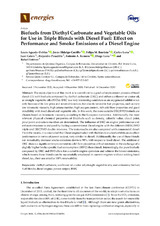Mostrar el registro sencillo del ítem
Biofuels from Diethyl Carbonate and Vegetable Oils for Use in Triple Blends with Diesel Fuel: Effect on Performance and Smoke Emissions of a Diesel Engine
| dc.contributor.author | Aguado-Deblas, Laura | |
| dc.contributor.author | Hidalgo-Carrillo, J. | |
| dc.contributor.author | Bautista, Felipa M. | |
| dc.contributor.author | Luna, Carlos | |
| dc.contributor.author | Calero, Juan | |
| dc.contributor.author | Posadillo, Alejandro | |
| dc.contributor.author | Romero, Antonio A. | |
| dc.contributor.author | Luna, Diego | |
| dc.contributor.author | Estévez, R. | |
| dc.date.accessioned | 2020-12-14T11:48:28Z | |
| dc.date.available | 2020-12-14T11:48:28Z | |
| dc.date.issued | 2020 | |
| dc.identifier.uri | http://hdl.handle.net/10396/20911 | |
| dc.description.abstract | The main objective of this work is to contribute to a gradual replacement process of fossil diesel (D) with biofuels composed by diethyl carbonate (DEC) and either sunflower or castor oil, as straight vegetable oils (SVOs). DEC is a very interesting candidate as an oxygenated additive not only because of its low price and renewable nature, but also its favorable fuel properties, such as very low kinematic viscosity, high cetane number, high oxygen content, rich cold flow properties and good miscibility with fossil diesel and vegetable oils. In this work, the more suitable DEC/SVO biofuels are chosen based on kinematic viscosity, according to the European normative. Additionally, the most relevant physical–chemical properties of (bio)fuels such as density, calorific value, cloud point, pour point and cetane number are determined. The influence of DEC on engine performance and exhaust emissions is analyzed by fueling a conventional Diesel engine with the different D/DEC/SVO triple and DEC/SVO double mixtures. The tests results are also compared with commercial diesel. From the results, it is concluded that Diesel engine fueled with the blends studied exhibits an excellent performance in terms of power output, very similar to diesel. Additionally, the use of these blends can remarkably decrease smoke emissions down to 98%, with respect to fossil diesel. The addition of DEC shows a significant improvement in cold flow properties of fuel mixtures in the exchange of a slightly higher brake specific fuel consumption (BSFC) than diesel. Interestingly, the pure biofuels composed by DEC and SVO allow for a suitable engine operation and achieve the lowest emissions, which means these blends can be successfully employed in current engines without adding fossil diesel, i.e., their use entail a 100% renewability. | es_ES |
| dc.format.mimetype | application/pdf | es_ES |
| dc.language.iso | eng | es_ES |
| dc.publisher | MDPI | es_ES |
| dc.rights | https://creativecommons.org/licenses/by/4.0/ | es_ES |
| dc.source | Energies 13(24), 6584 (2020) | es_ES |
| dc.subject | Diethyl carbonate | es_ES |
| dc.subject | Sunflower oil | es_ES |
| dc.subject | Castor oil | es_ES |
| dc.subject | Straight vegetable oils | es_ES |
| dc.subject | Soot emissions | es_ES |
| dc.subject | Biofuel | es_ES |
| dc.subject | Fuel blends | es_ES |
| dc.subject | Diesel engine | es_ES |
| dc.subject | Power output | es_ES |
| dc.subject | BSFC | es_ES |
| dc.title | Biofuels from Diethyl Carbonate and Vegetable Oils for Use in Triple Blends with Diesel Fuel: Effect on Performance and Smoke Emissions of a Diesel Engine | es_ES |
| dc.type | info:eu-repo/semantics/article | es_ES |
| dc.relation.publisherversion | http://dx.doi.org/10.3390/en13246584 | es_ES |
| dc.relation.projectID | Gobierno de España. ENE2016-81013-R | es_ES |
| dc.relation.projectID | Gobierno de España. PID2019-104953RB-100 | es_ES |
| dc.relation.projectID | Junta de Andalucía. 1264113-R | es_ES |
| dc.relation.projectID | Junta de Andalucía. 1264113-R (CATOLIVAL) | es_ES |
| dc.rights.accessRights | info:eu-repo/semantics/openAccess | es_ES |

